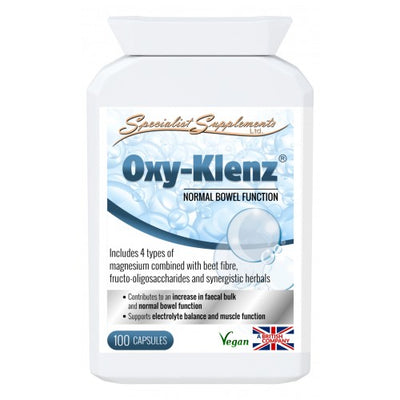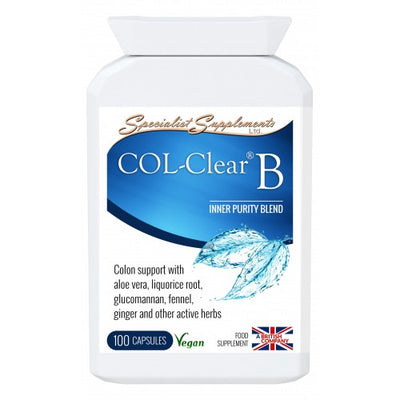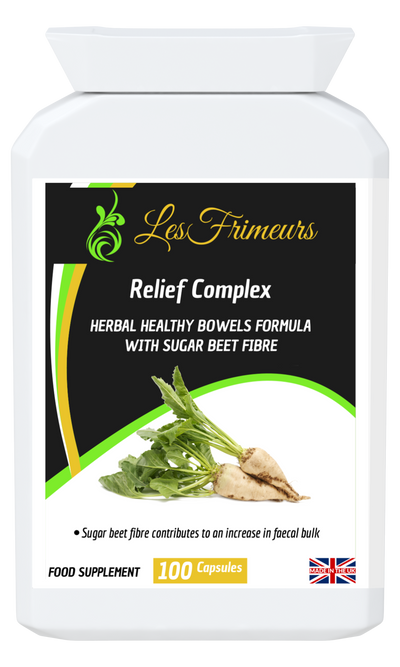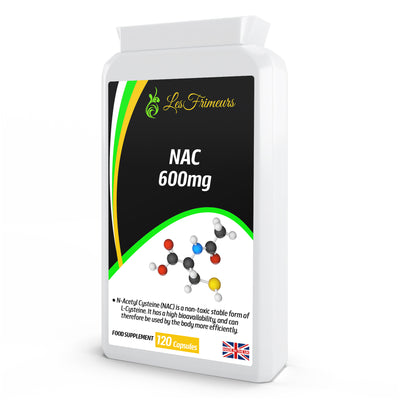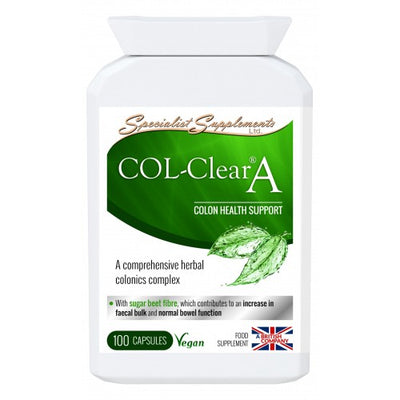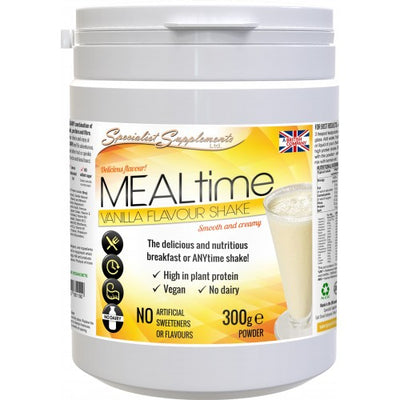Oxy-Klenz
Product summary:
100 capsules
A magnesium based bowel health formula, with dietary fibre and ingredients specifically selected to contribute to an increase in faecal bulk.
Oxy-Klenz contains: magnesium sulphate, magnesium citrate, magnesium oxide, magnesium hydroxide, sugar beet fibre, ascorbic acid (vitamin C), citric acid, citrus bioflavonoids, apple cider vinegar powder and fructo-oligosaccharides (FOS, a prebiotic) - ingredients designed to support the hydrating actions of the magnesium, as well as normal bowel function.
This food supplement is ideal used as part of a cleanse and detox programme.


More information:
Oxy-Klenz at a glance...
Magnesium based bowel blend
With 4 types of magnesium
Contributes to an increase in faecal bulk
Support of electrolyte balance
Support of energy levels
Support of immunity
With FOS fibres
Dairy and gluten free
Suitable for vegetarians and vegans
About the ingredients...
Sugar beet fibre:
Sugar beet, cultivated Beta vulgaris, is a plant whose root contains a high concentration of sucrose (as its name suggests). It is grown commercially for sugar production. Sugar beets are related to other B. vulgaris cultivars, such as beetroot and chard.
Sugar beets consist of approximately 75% water, 20% sugar and 5% cell walls. After the sugar is extracted, remaining cell wall material - the sugar beet pulp - is used to produce the sugar beet fibre.
This source of dietary fibre contains both soluble and insoluble fibres. The main fibre types in sugar beet fibre are insoluble hemicellulose (22-32 %) and soluble pectin (22-29 %), but also smaller amounts of cellulose and lignin. It has a water-holding capacity of 3-4 times its own weight.
Compared to many conventional natural sources of dietary fibre, such as cereal products and fruits, sugar beet fibre has the following advantages:
- It has a higher content of dietary fibre, with an ideal balance of 2/3 insoluble fibre.
- It contains no phytic acid (cereal products, such as bran and flour, contain phytic acid which forms strong chemical complexes with iron and zinc and can consequently impair or reduce the natural absorption of these essential minerals in the human body).
- It is naturally free from gluten, which means it is an excellent dietary fibre source for people suffering from gluten intolerance.
Sugar beet fibre contributes to an increase in faecal bulk in two ways: the insoluble components of the fibre increase faecal bulk by absorbing water in the large intestine, while the soluble components are fermented by bacteria in the large intestine leading to an increase in bacterial mass. Click here for EFSA scientific opinion.
Magnesium:
An abundant mineral in the body, magnesium is a cofactor in more than 300 enzyme systems that regulate diverse biochemical reactions in the body. It contributes to a reduction of tiredness and fatigue, electrolyte balance, normal energy-yielding metabolism, normal functioning of the nervous system, normal muscle function, normal protein synthesis, normal psychological function, the maintenance of normal bones and teeth, and it has a role in the process of cell division. Click here and here for EFSA scientific opinions.
Vitamin C:
Vitamin C contributes to maintaining the normal function of the immune system. It also contributes to normal collagen formation for the normal function of blood vessels, bones, cartilage, gums, skin and teeth, normal energy-yielding metabolism, normal functioning of the nervous system, normal psychological function, protection of cells from oxidative stress, the reduction of tiredness and fatigue, the regeneration of the reduced form of vitamin E and increases iron absorption. Click here and here for EFSA scientific opinions.
Citrus bioflavonoids:
"Bioflavonoid" is a generic term used to describe biologically active members of the group of plant-derived compounds known as flavonoids. Bioflavonoids were first discovered in 1936 by Nobel-prize winning scientist and vitamin C research pioneer Albert Szent-Gyorgi, who originally named the group of compounds "vitamin P." Since then, over 4,000 flavonoids have been identified and classified according to chemical structure. Citrus bioflavonoids are derived from fruits high in vitamin C.
Apple cider vinegar powder:
Apple cider vinegar is fermented juice from crushed apples. It contains some pectin, as well as: vitamins B1, B2, B6 and C; biotin; folic acid; niacin; and pantothenic acid. It also contains enzymse and small amounts of the minerals sodium, phosphorous, potassium, calcium, iron, and magnesium. Apple cider vinegar can also contain significant quantities of acetic acid and citric acid.
Fructo-oligosaccharides (FOS):
FOS is a soluble dietary fibre powder and prebiotic. Prebiotics are a source of food for good bacteria (in particular the Bifidobacteria genus), helping them to grow, multiply and survive in the gut. This is because they are fibres which cannot be absorbed or broken down by the body. Prebiotics by nature do not stimulate the growth of bad bacteria or other pathogens. They occur naturally in our diet and prebiotic fibres can be found in Jerusalem artichokes, garlic, chicory and onions amongst other things.



